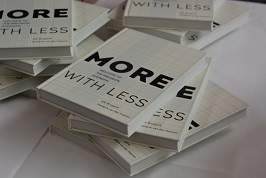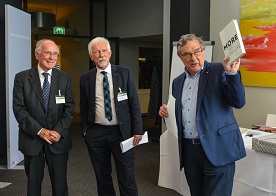For us, April 21st was a day to remember. A month ahead of schedule we presented our new book: More with Less, welcome to the Precision Economy. The scene was a conference in Groningen where the latest results of modern research on carbohydrate chemistry were presented. A scene where the major players in the Dutch food industry and several policy makers in innovation were present.
 After the success of our Dutch book on Green Growth, Towards the Society of 2040, we decided to continue with an edition in English. On the way we discovered that many developments predicted in our book were becoming reality a lot faster than we had foreseen. Sustainable energy was no longer a promise, a potential solution to prevent climate changes and energy shortages, it was making a take-off. The development of new strategies to feed the world population was no longer just a great challenge: new approaches, based on a thorough knowledge of the extensive plant and soil microbiomes, were underway already. Green materials and bioplastics kept on making inroads in the substitution of fossil-based materials. Precision health care, not just on the basis of ICT but also with a solid biochemical background, revolutionises this sector. All in all, in the end we wrote More with Less, a completely new book. Here we give you a glimpse of its contents.
After the success of our Dutch book on Green Growth, Towards the Society of 2040, we decided to continue with an edition in English. On the way we discovered that many developments predicted in our book were becoming reality a lot faster than we had foreseen. Sustainable energy was no longer a promise, a potential solution to prevent climate changes and energy shortages, it was making a take-off. The development of new strategies to feed the world population was no longer just a great challenge: new approaches, based on a thorough knowledge of the extensive plant and soil microbiomes, were underway already. Green materials and bioplastics kept on making inroads in the substitution of fossil-based materials. Precision health care, not just on the basis of ICT but also with a solid biochemical background, revolutionises this sector. All in all, in the end we wrote More with Less, a completely new book. Here we give you a glimpse of its contents.
More with Less: more and better results with less inputs
Mankind is about to turn upside down economic self-evident truths, by the breakthrough of precision technologies like solar energy and precision agriculture, and by precision social arrangements like sharing instead of owning. So far, mankind could only produce more wealth by using more feedstock, depleting the earth’s resources and polluting the environment. Precision will end this practice. Precision will enable us to produce products better tuned to the needs of consumers, from less resources: more with less.

In order to reap these benefits of precision, mankind will have to change its habits, for instance in taxation. Like charging fossil and mineral resources, and facilitating recycling. Cheap renewable energy will allow us to curb fossil fuel recovery and stimulate circular practices like product longevity and reuse. It will allow us to develop new social arrangements like contracting out property, reuse and replacement of goods and services. It will allow us to upcycle materials, for instance from graphite in batteries to graphene in smartphones and chips, just to mention a futuristic option. Mankind will develop precision for application in smart materials and in machinery, and in producing and processing food, including processing agricultural side streams to new materials. We will be able to buy precision grown vegetables from mini greenhouses adjacent to the supermarket, reusing and recycling energy, packaging and leftovers. Producing just what is required will enable mankind to feed ten billion people, strongly reducing damage done to the planet. In our book More with Less we show that mankind already has the required knowledge and know-how at hand.
